Mary Sheehan (née Doran) from Askamore, Co Wexford, is farming in her own right.
It’s a phrase she finds herself saying often.
“Sometimes men think women can’t farm,” she says at her kitchen table where she laughs about the things that have been said to her.
“They think your husband is the farmer, or your father. I’ve had people ask, ‘Why don’t you get your brother or father to buy the cattle for you?’ That’s an awful insult – I even sell for my brother sometimes.”

Mary, whose main enterprises are sucklers and rearing heifers to beef, has always loved farming.
“I’m happy outdoors – rain, hail or snow.”
Keeping stock began in her teens after she had taken time late one night to check on ewes. Her father gave her the lambs that she had saved from foxes. She bought a calf after selling those lambs and her stock levels grew from there. Cattle remain an abiding interest.
“They are my sanity,” she says, a statement that would become clearer later on. The yard being her sanctuary would be mentioned too.
The eldest of three reared on a nearby tillage farm, she worked in horticulture after leaving school and before marrying her husband, John Sheehan from Killanerin, Co Wexford, at the age of 23.
A digger driver, John worked in the construction sector while Mary kept an agricultural sideline going, rearing calves and sheep on rented land as their four children grew. Her dream was always to buy land but good fortune was to simplify matters when her uncle John Doran left his farm to her in Askamore in 1998.
Emotion is obvious as she mentions it.
“I couldn’t believe it when I was told,” she says.
She points out her uncle’s photograph over the door. In it he is standing at a gate near the house where his cattle are visible in the sloping field behind.
“I’ve had four generations of sucklers in that same field since,” she said. Yes, it would be a good place to have the photographs for this article taken.
Tragedy struck the Sheehan family, however, in a devastating way on 15 November 2000 when John died in a road traffic accident.
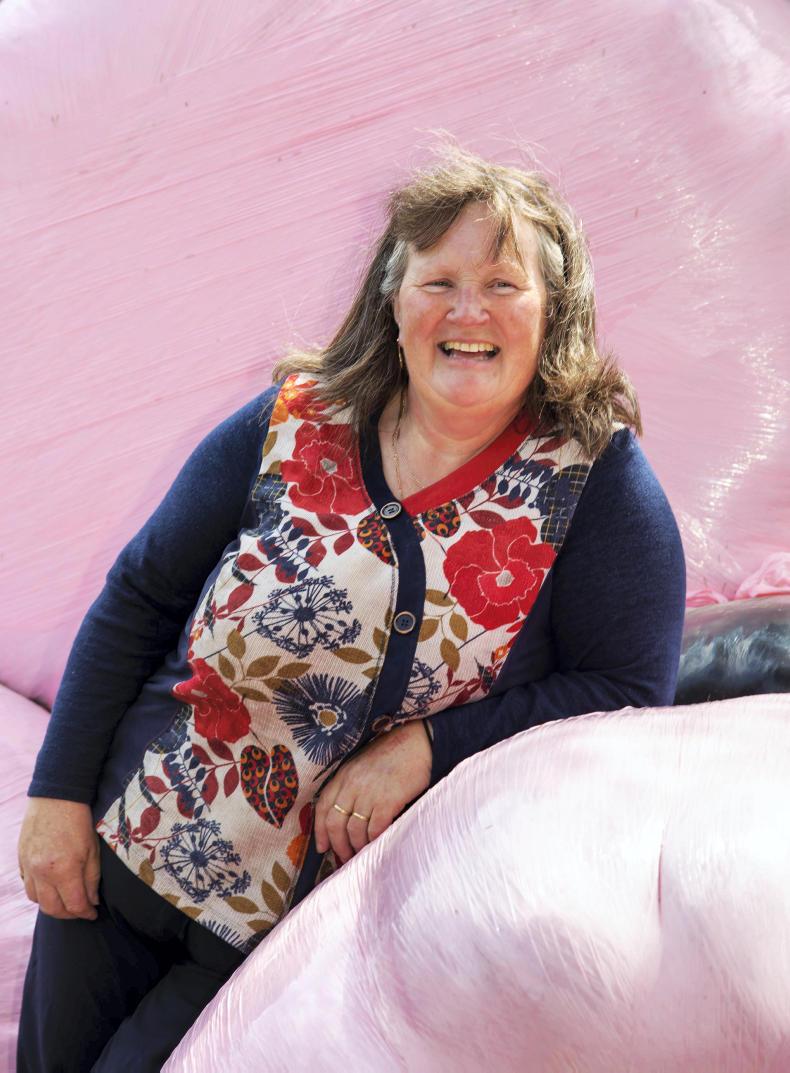
The couple’s four children – Sean, Mairead, Mary Anne and Liam – were aged from nine years to 13 months at the time.
“When John was killed I hadn’t time to grieve,” Mary says.
“I had four children to rear and a farm to run. I think it was five years later that it hit me. I still find news of car accidents difficult to this day.”
Mary didn’t appreciate having to argue with the bank at that time either when they wanted to freeze her farm account.
“I had to fight with them not to. I was farming in my own right. John’s name wasn’t on the farm account – he’d never wanted it there. Luckily it wasn’t or everything would have been tied up and I’d have been dependent on them giving me a loan to keep going for God knows how long. Now I tell people with farms or businesses, particularly if they have small children, to always have separate accounts as well as a joint one.”
Mary has no doubt but that her love of farming helped her cope in such difficult times.
“The yard was my sanctuary. I’d talk to the cows, pet them. During the funeral, cows were calving. I’d escape to the yard when I couldn’t talk to people anymore.”
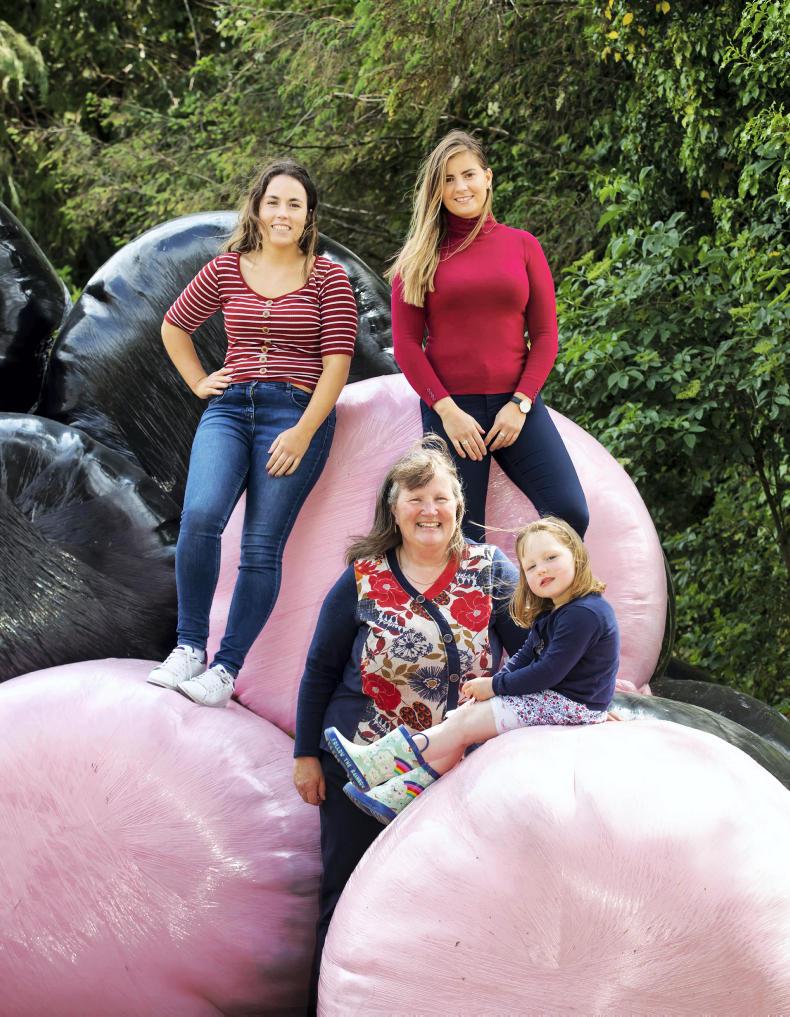
Mary with daughters Mary Anne and Mairéad and granddaughter Alysha. \ Mary Browne
Mary’s children are now aged 28 down to 20. Sean is studying sustainable farm management in Carlow IT, Mairead is a secondary school teacher,
Mary Anne is an accountant with ifac and Liam, who has completed his Green Cert, works with a local contractor.
She has high praise for her children. “It hasn’t been easy for them but they’re doing well and I’m very thankful for that.”
Mary now has more freedom given that her children are reared, she says, and she takes the opportunity to go on holiday, often by herself, travelling as far away as Iceland and Italy and as close by as Lisdoonvarna.
She likes seeing other parts of the world, she says.
“When I come back I appreciate our green grass. When the seasons work the right way in this country, it’s great.”
The marts in Carnew, Enniscorthy and Tullow are social outlets for her, she says. She once wore pink wellies there after a bet that she couldn’t show her feminine side.
“About 99% of the time I’m the only woman in the mart. The lads were getting on to me that I am always in my farming clothes so I bought a pair of pink wellies in Lidl and wore them to prove I could!”
She put them aside after that, though. “Too soft for farming,” she says, “no steel toecaps.”
While farming work is no problem, Mary admits that life can be lonely at times.
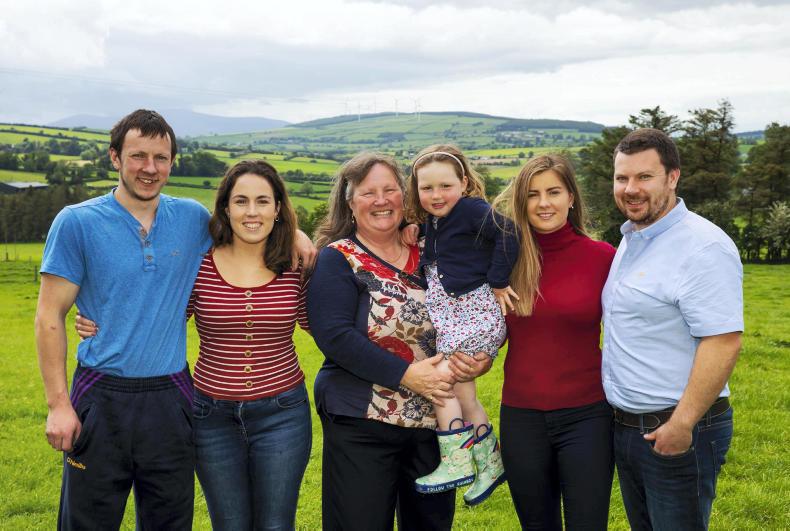
Mary with her children Liam, Mairéad, Maryanne and Sean and granddaughter Alysha.\ Mary Browne
“Farming is lonely anyway as you’re on your own 90% of the time. Sometimes when you’re trying to get a sick animal home by yourself you’d say, ‘Is there a better way of life than this?’ But I love farming – it’s what I always wanted.”
But did Mary ever think of marrying again?
“Lots of people suggested that I should, but it hasn’t happened. I love dancing and I do go dancing, but when the kids were small I wouldn’t ask any man to take on responsibility for four children.”
While there was someone special for a while it didn’t work out.
“It’s hard for someone not in farming to understand that you could be planning to go out and then a cow could be calving and you’d have to get back into the wellies. At this stage, I am used to my independence. Maybe I’m getting too set in my ways!”
Does Mary tell people she is a farmer when she is out, I asked?
“I try not to talk about farming because you always hear people say, ‘Farmers – always whingeing about the weather or the prices’.”
She has been known to describe herself as a self-employed entrepreneur in the agricultural sector though.
“I heard that at a conference one time. People ask me, ‘What’s that in plain language?’ I say, ‘A farmer’. That’s a good description of farming though!”
Mary believes that there are a lot of women not getting credit for the work they do on farms.
“They’re rearing calves, doing the paperwork… Men don’t always acknowledge it but they should.”
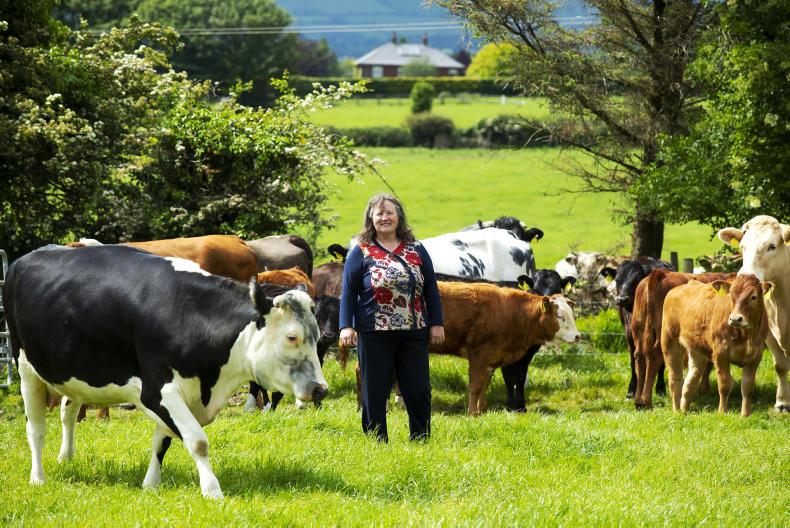
Secretary of the Askamore branch of the IFA, Mary also believes that she has had to prove herself more just because she is a farming woman.
“I had four Department inspections in one year. I remember saying at the IFA meetings, ‘Who else has had that many?’ Most had none. They said it was just my name coming out randomly but I found that hard to believe.”
And the future – where does she see herself going, enterprise-wise?
“I don’t know about the sucklers but I’ll keep going with the heifers. My son wants me to go dairying but there’s too much calving in that for me.”
Before leaving, we stand at the gate where her uncle once stood and talk about taking some photographs.
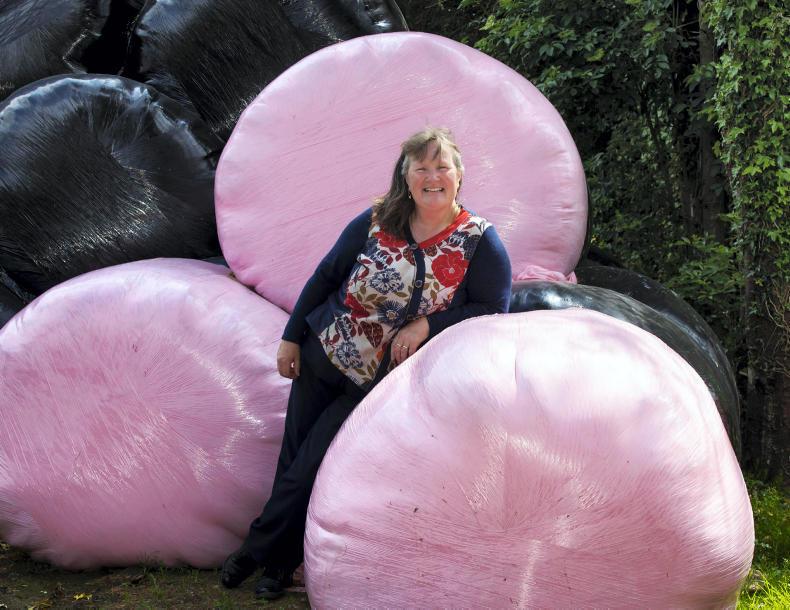
There are silage bales beside us – three of them pink.
“It’s a pity we weren’t at the silage,” Mary says. “I’d have been on top of the pit.”
Mary Sheehan (née Doran) from Askamore, Co Wexford, is farming in her own right.
It’s a phrase she finds herself saying often.
“Sometimes men think women can’t farm,” she says at her kitchen table where she laughs about the things that have been said to her.
“They think your husband is the farmer, or your father. I’ve had people ask, ‘Why don’t you get your brother or father to buy the cattle for you?’ That’s an awful insult – I even sell for my brother sometimes.”

Mary, whose main enterprises are sucklers and rearing heifers to beef, has always loved farming.
“I’m happy outdoors – rain, hail or snow.”
Keeping stock began in her teens after she had taken time late one night to check on ewes. Her father gave her the lambs that she had saved from foxes. She bought a calf after selling those lambs and her stock levels grew from there. Cattle remain an abiding interest.
“They are my sanity,” she says, a statement that would become clearer later on. The yard being her sanctuary would be mentioned too.
The eldest of three reared on a nearby tillage farm, she worked in horticulture after leaving school and before marrying her husband, John Sheehan from Killanerin, Co Wexford, at the age of 23.
A digger driver, John worked in the construction sector while Mary kept an agricultural sideline going, rearing calves and sheep on rented land as their four children grew. Her dream was always to buy land but good fortune was to simplify matters when her uncle John Doran left his farm to her in Askamore in 1998.
Emotion is obvious as she mentions it.
“I couldn’t believe it when I was told,” she says.
She points out her uncle’s photograph over the door. In it he is standing at a gate near the house where his cattle are visible in the sloping field behind.
“I’ve had four generations of sucklers in that same field since,” she said. Yes, it would be a good place to have the photographs for this article taken.
Tragedy struck the Sheehan family, however, in a devastating way on 15 November 2000 when John died in a road traffic accident.

The couple’s four children – Sean, Mairead, Mary Anne and Liam – were aged from nine years to 13 months at the time.
“When John was killed I hadn’t time to grieve,” Mary says.
“I had four children to rear and a farm to run. I think it was five years later that it hit me. I still find news of car accidents difficult to this day.”
Mary didn’t appreciate having to argue with the bank at that time either when they wanted to freeze her farm account.
“I had to fight with them not to. I was farming in my own right. John’s name wasn’t on the farm account – he’d never wanted it there. Luckily it wasn’t or everything would have been tied up and I’d have been dependent on them giving me a loan to keep going for God knows how long. Now I tell people with farms or businesses, particularly if they have small children, to always have separate accounts as well as a joint one.”
Mary has no doubt but that her love of farming helped her cope in such difficult times.
“The yard was my sanctuary. I’d talk to the cows, pet them. During the funeral, cows were calving. I’d escape to the yard when I couldn’t talk to people anymore.”

Mary with daughters Mary Anne and Mairéad and granddaughter Alysha. \ Mary Browne
Mary’s children are now aged 28 down to 20. Sean is studying sustainable farm management in Carlow IT, Mairead is a secondary school teacher,
Mary Anne is an accountant with ifac and Liam, who has completed his Green Cert, works with a local contractor.
She has high praise for her children. “It hasn’t been easy for them but they’re doing well and I’m very thankful for that.”
Mary now has more freedom given that her children are reared, she says, and she takes the opportunity to go on holiday, often by herself, travelling as far away as Iceland and Italy and as close by as Lisdoonvarna.
She likes seeing other parts of the world, she says.
“When I come back I appreciate our green grass. When the seasons work the right way in this country, it’s great.”
The marts in Carnew, Enniscorthy and Tullow are social outlets for her, she says. She once wore pink wellies there after a bet that she couldn’t show her feminine side.
“About 99% of the time I’m the only woman in the mart. The lads were getting on to me that I am always in my farming clothes so I bought a pair of pink wellies in Lidl and wore them to prove I could!”
She put them aside after that, though. “Too soft for farming,” she says, “no steel toecaps.”
While farming work is no problem, Mary admits that life can be lonely at times.

Mary with her children Liam, Mairéad, Maryanne and Sean and granddaughter Alysha.\ Mary Browne
“Farming is lonely anyway as you’re on your own 90% of the time. Sometimes when you’re trying to get a sick animal home by yourself you’d say, ‘Is there a better way of life than this?’ But I love farming – it’s what I always wanted.”
But did Mary ever think of marrying again?
“Lots of people suggested that I should, but it hasn’t happened. I love dancing and I do go dancing, but when the kids were small I wouldn’t ask any man to take on responsibility for four children.”
While there was someone special for a while it didn’t work out.
“It’s hard for someone not in farming to understand that you could be planning to go out and then a cow could be calving and you’d have to get back into the wellies. At this stage, I am used to my independence. Maybe I’m getting too set in my ways!”
Does Mary tell people she is a farmer when she is out, I asked?
“I try not to talk about farming because you always hear people say, ‘Farmers – always whingeing about the weather or the prices’.”
She has been known to describe herself as a self-employed entrepreneur in the agricultural sector though.
“I heard that at a conference one time. People ask me, ‘What’s that in plain language?’ I say, ‘A farmer’. That’s a good description of farming though!”
Mary believes that there are a lot of women not getting credit for the work they do on farms.
“They’re rearing calves, doing the paperwork… Men don’t always acknowledge it but they should.”

Secretary of the Askamore branch of the IFA, Mary also believes that she has had to prove herself more just because she is a farming woman.
“I had four Department inspections in one year. I remember saying at the IFA meetings, ‘Who else has had that many?’ Most had none. They said it was just my name coming out randomly but I found that hard to believe.”
And the future – where does she see herself going, enterprise-wise?
“I don’t know about the sucklers but I’ll keep going with the heifers. My son wants me to go dairying but there’s too much calving in that for me.”
Before leaving, we stand at the gate where her uncle once stood and talk about taking some photographs.

There are silage bales beside us – three of them pink.
“It’s a pity we weren’t at the silage,” Mary says. “I’d have been on top of the pit.”













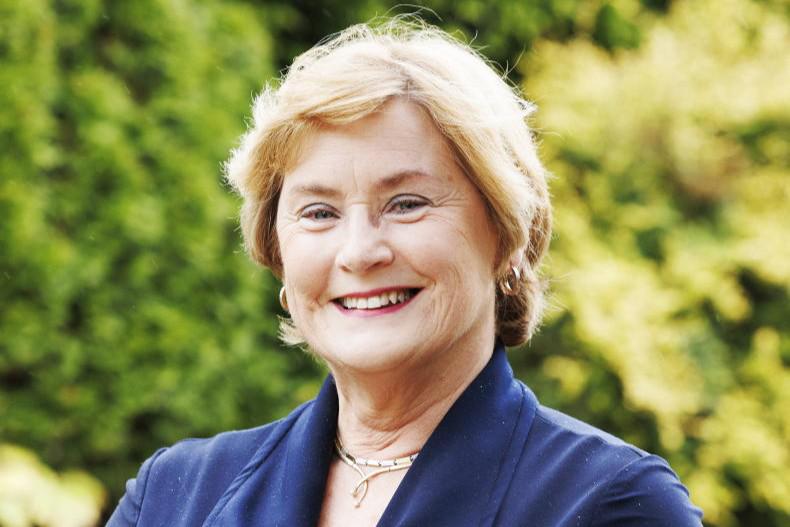
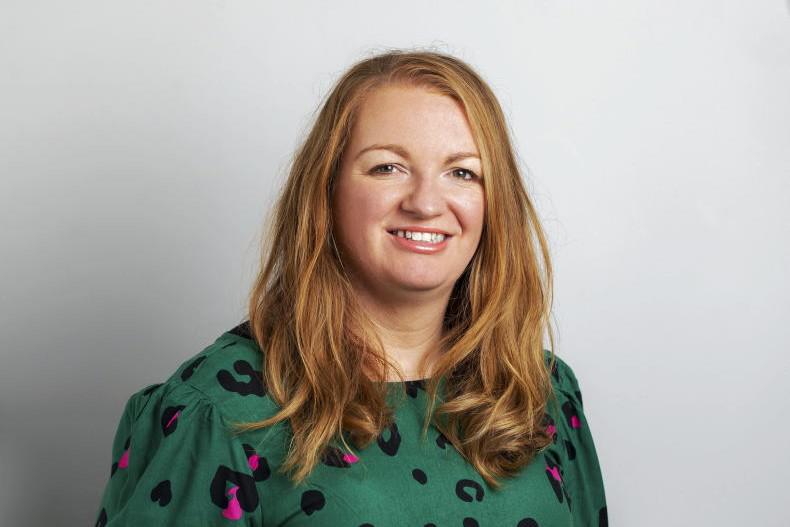
SHARING OPTIONS